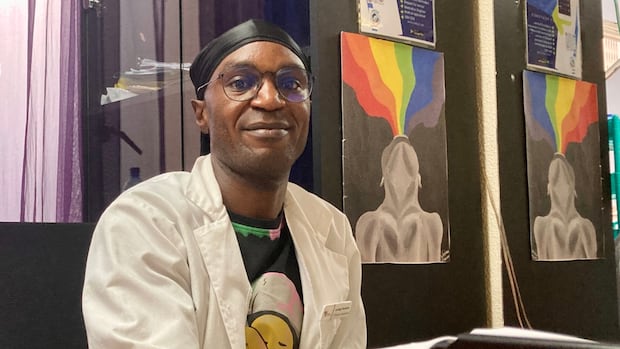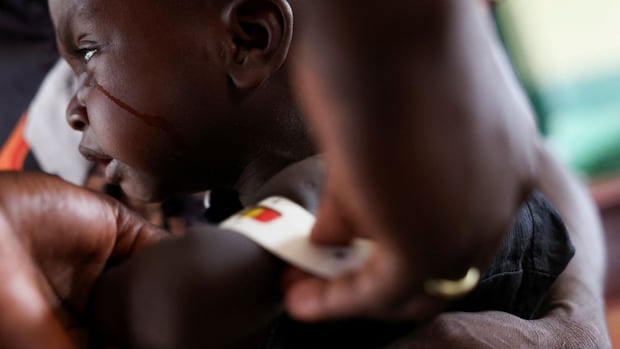Ibrahim Lwingi lost both of his parents due to HIV-related illnesses when he was 14. The Nairobi native describes himself as an orphan even today — he’s now 43.
The virus also took the lives of some of his uncles, and Lwingi, who is gay, believes he would’ve been next had it not been for revolutionary HIV prevention medication. He’s been able to access pre-exposure prophylaxis (PrEP) for free through clinics in Kenya run by the University of Manitoba, which says the clinics serve more than 30,000 clients.
But he may soon lose access to that medication as U.S. President Donald Trump’s administration moves to cut the foreign aid spending that funds the university’s sex workers outreach program, or SWOP, that’s been operating in Nairobi since the early 1980s. Staff at the SWOP clinics are worried about what this might mean for their clients and for the general Kenyan population.
“They basically cast us adrift,” said Larry Gelmon, the university program’s director based in Nairobi.
Their funding comes from the President’s Emergency Plan for AIDS Relief (PEPFAR), a global health fund meant to combat HIV/AIDS launched by then U.S. president George W. Bush in 2003. Trump’s big tax and spending bill tried to cut $400 million slated for PEPFAR in 2026, but that funding was restored after several Republican senators objected.
However, the New York Times has reported that the Trump administration has been withholding more than half of the PEPFAR funds for the coming fiscal year. CBC News reached out to the U.S. government for comment about PEPFAR funding not being allocated, but did not hear back in time for publication.
Programs that provide medications and condoms have had a serious impact on HIV/AIDS transmissions rates in the country. In the mid-1990s, about 10 per cent of Kenyans were living with HIV. As of 2023, that was down to 3.2 per cent according to UNAIDS, however, the country still has the 11th highest rate of HIV globally.
The search for other funding
Gelmon and his team have come up with a plan to avoid the complete shut down of all 10 SWOP clinics they run across Nairobi. They’ll be using emergency funds from the university — a stop gap as they try to secure more funding.
“Basically, it’s keeping three clinics open with a very skeleton staff for three months, and keeping … our original clinic open for another year, again with a skeleton staff,” said Gelmon.
A handful of workers will remain at each clinic, but he says the rest will be laid off, with notices already sent to more than 100 staff members who will be gone by the end of the month.
A freeze on USAID research funding could kill a University of Manitoba outreach program that saves lives in Nairobi. Assistant Prof. Julie Lajoie says 50,000 people get AIDs prevention drugs through the program, and now their lives are at risk.
Unless the clinics figure out other funding options, patients like Lwingi will only have access to PrEP until the end of the year. He hasn’t figured out what he’ll do if he can’t get the medication.
“Believe me, if there is no PrEP, I’m going to be HIV positive,” he said.
“Because of the challenges that I faced growing up, I didn’t want my son to go through the challenge of not having someone to support him,” said Lwingi, recalling what he went through as a child.
Gelmon says they’ve applied for a number of grants and sent an unsolicited funding request to Global Affairs Canada, but he explained that U.S. funding cuts have created “fierce competition” for whatever grants are left.
He says they were told in a rejection letter for one of the grants they applied for that there were over 300 applicants.
The problem with public clinics
The SWOP clinics also provide free antiretroviral therapy (ART) to people living with HIV, but that, too, will be coming to an end, says Gelmon. Their clients will be forced to get their medication from public clinics, which some say have stigmatized them in the past.
Gladice Instaconge is a sex worker living with HIV who accesses SWOP services at a clinic in the east end of Nairobi. She’s a peer educator there, too.
“They mock you,” she said, breaking down in tears, recalling her troubling experiences in the country’s public-health system. “Like, ‘You, how did you get this disease?’ “

Joyce Adhiambo, also a sex worker living with HIV, stressed that these are more than just clinics — they’re safe spaces for this community where people can “gain courage and strength” by speaking about HIV without fear of reprisal.
“Even if you mock me, you cannot reverse my HIV status,” she said. “If it were not for this clinic, some of us would be dead by now.”
Joshua Kimani, the head of clinical services for SWOP, says these safe spaces are crucial because Kenya is a religious country where sex work and same-sex relations are frowned upon and illegal — and those values can seep into the public health-care system.
“The problem is the services of the public-health sector are not well funded, and so there are many gaps,” he said.
After the White House’s push to dismantle the United States Agency for International Development (USAID) cancelled billions of dollars in spending for foreign aid, researchers say global health funding is expected to reach a 15-year low.
Read more: https://www.cbc.ca/1.7451437, https://www.cbc.ca/.7461875.
Right now, patients can get prescriptions filled for free, on the spot at the SWOP clinics, which Kimani says can help stop the spread of sexually transmitted infections immediately.
Without the clinics, Kimani says sex workers need money to get prescriptions filled. “For them to buy the drugs, they have to sell more sex. And so, more infections.”
Gelmon stressed that at-risk populations don’t live in a vacuum and could impact others if they become infected.
“By preventing infection in this group, you help to protect the larger community from infection.”
‘I wouldn’t like to be Dr. Death again’
Kimani says he’s not giving up hope despite the cancellation of their current funding and the fact that they aren’t guaranteed to be awarded any of the grants they’ve applied for.
He’s been doing this work in Nairobi since 1993, and says though they often faced significant challenges and layoffs, they’ve always managed to find some funding.
“We don’t want to go back to 2004 where people were dying like flies,” he said. “That time we were just signing death certificates.”
But he says things have changed over the last few years, and he doesn’t want to go back to those times.
“I wouldn’t like to be Dr. Death again.”









